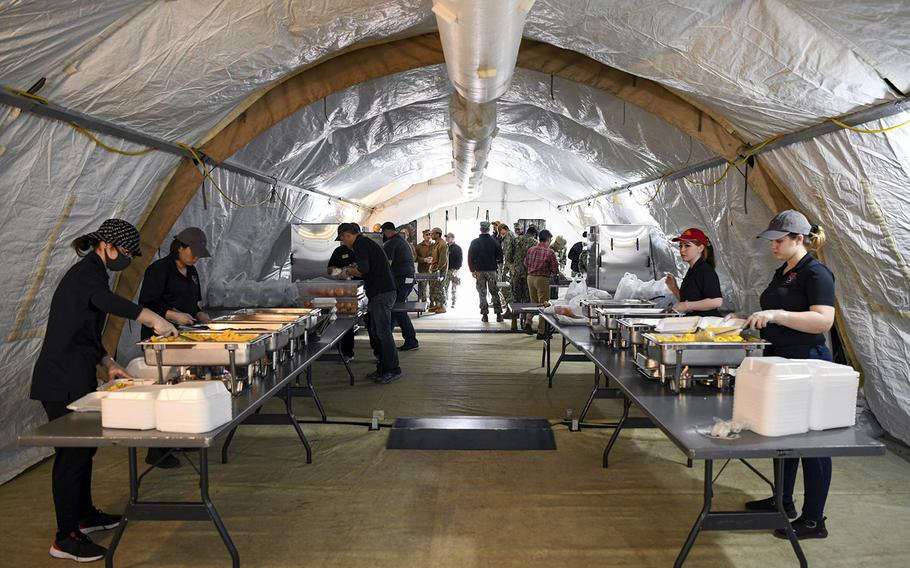
Sailors and airmen prepare food for personnel in isolation due to coronavirus restrictions at Naval Air Facility Misawa, Japan, on April 1, 2020. (Jan David Mercado/U.S. Navy)
Stars and Stripes is making stories on the coronavirus pandemic available free of charge. See other free reports here. Sign up for our daily coronavirus newsletter here. Please support our journalism with a subscription.
Commanders at U.S. military bases in Japan are urging service members, civilian employees and their families to keep their holiday festivities at home to avoid spreading the coronavirus.
U.S. commanders toughened up restrictions while reminding their people of basic measures as a record surge in new coronavirus cases swept across Japan, especially Tokyo, in the past 1 ½ months.
At Yokosuka Naval Base, for example, more than sailors were isolated after having contact with infected sailors earlier this month.
As a result, base commander Capt. Rich Jarrett imposed a limit on gatherings of a maximum five individuals or two households. He also put Yokohama city off-limits and re-emphasized requirements on social distancing, hygiene and wearing masks.
Jarrett in a Facebook video posted Dec. 17 decried a lack of discipline among some who disregarded limits set to constrain the virus’s spread.
Commanders elsewhere made similar changes to their base safety measures. Some are standard: wearing masks, maintaining contact logs and keeping at least six feet apart. But other restrictions vary, for example, some commanders permit dining indoors at restaurants, others do not.
In Okinawa, for example, Air Force, Marine Corps and Army bases are restricting personnel from public transportation. Dining inside restaurants, or even waiting inside off-base restaurants and cafes for take-out orders, is also prohibited at some posts .
At Sasebo Naval Base, on the island of Kyushu, sailors may not stay overnight in hotels.
Every installation has posted its restrictions on its Facebook page. Many have pinned those orders at the top of the page, along with a color-coded map of areas that are off-limits, high-risk or low-risk. Permitted areas for off-duty travel vary from one base to another.
For holiday get-togethers, military public health experts recommend individually prepared meals rather than grazing buffet style and inviting distant family and friends to virtual hangouts rather than gathering in person.
“Being close doesn’t always mean proximity,” Marine Corps Installation Pacific wrote Sunday on its Facebook page.
With a coronavirus vaccine for frontline medical providers and first responders available within two weeks, commanders across Japan urged their subordinates to hang tough a bit longer.
“If Santa fulfilled my wish list and brought enough vaccines for the entire base (along with a soothing bath bomb for each of us), nothing would change in the short term,” Col. Lance Lewis, commander of Marine Corps Air Station Iwakuni, said in a Facebook post Tuesday. “As we enter the holiday season, stay vigilant, but take a moment to rest and appreciate all we have accomplished together.”
earl.erica@stripes.com Twitter: @ThisEarlGirl